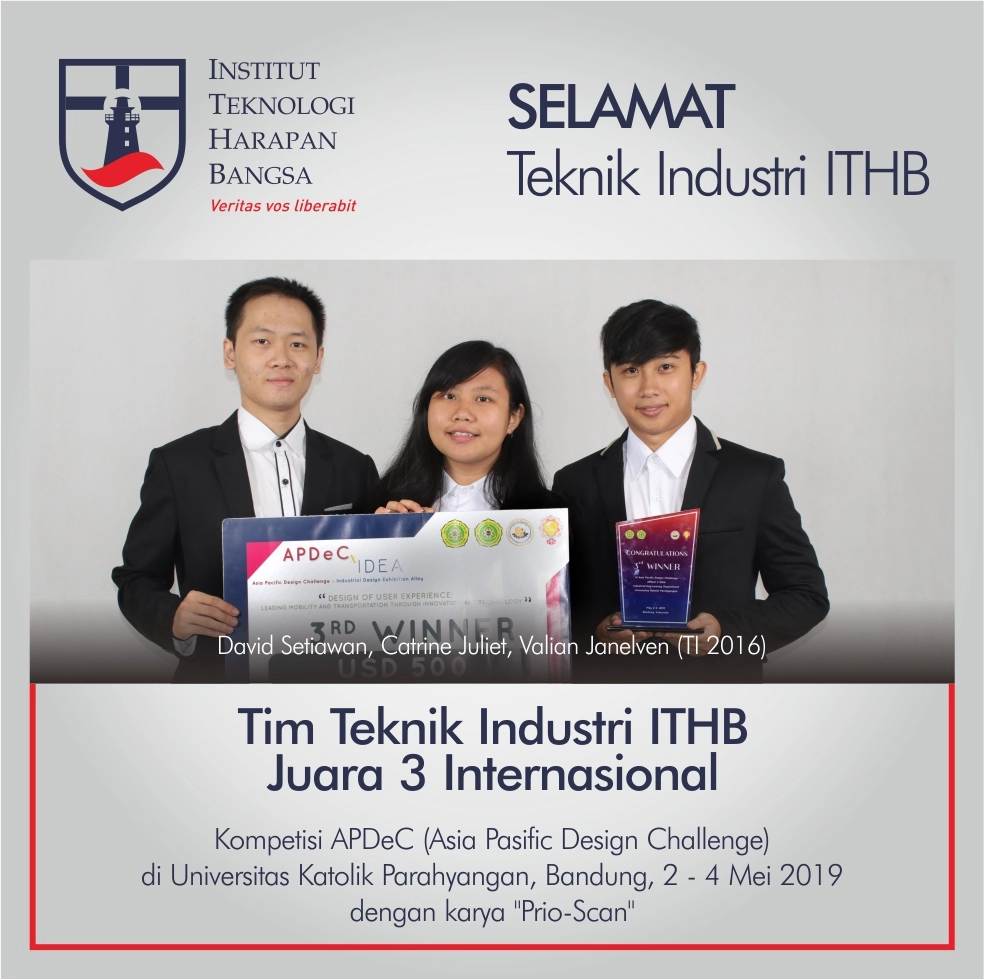
-
Manufacturing technology in Indonesia has moved towards Industry 4.0, which uses Internet of Things (IoT) technology, Artificial Intelligence, Machine Learning and Smart Factory. This development requires the support of Industrial Engineering graduates who are able to design, integrate, and improve system performance
-
The Industrial Engineering curriculum which emphasizes effective and efficient system management opens up broad job opportunities in various fields
-
Industry in the world, especially in Indonesia, has moved towards the use of Industry 4.0 technology, which uses Internet of Things (IoT) technology, Artificial Intelligence, Machine Learning and Smart Factory, requiring Industrial Engineering graduates who know and are able to design and use technology
-
The manufacturing industry in Indonesia continues to grow and develop.
| Introduction to Industrial Engineering |
2 |
| Systems Approach |
2 |
| Basic Calculus | 3 |
| Basic Physics I | 3 |
| Practicum Basic Physics I | 1 |
| Environmental Knowledge | 2 |
| Religious education | 2 |
| Scientific Writing Procedures | 2 |
| English I | 2 |
| General Computer Skills and communication Skills | – |
| Total SKS | 19 |
| Problem Solving | 2 |
| Matrix | 3 |
| Basic Physics II | 3 |
| Materials Engineering | 3 |
| Chemical Industry | 2 |
| Drawing Techniques | 2 |
| Practicum Drawing Techniques | 1 |
| Core Skill And Characters | 2 |
| English II | 2 |
| Total SKS | 20 |
| System Modeling | 2 |
| Economics | 2 |
| Engineering Mechanics | 3 |
| Industrial Statistics I | 2 |
| Industrial Psychology | 2 |
| Production Planning and Control | 3 |
| Manufacturing Process | 3 |
| SAP ERP Introduction |
1 |
| Programming Logic | 2 |
| Total SKS | 20 |
| System Simulation |
2 |
| Industrial Statistics II | 2 |
| Operational Research I | 3 |
| Behavior and Organizational Design | 2 |
| Job Design Analysis |
2 |
| Cost Analysis & Estimation | 3 |
| Practicum Industrial engineering design I | 1 |
| Supply chain system |
2 |
| SAP ERP Configuration | 1 |
| Computer programming | 2 |
| Career Planning |
– |
| Total SKS |
20 |
| Operational Research II | 3 |
| Engineering Economics |
2 |
| Ergonomics | 2 |
| Industrial Engineering Design Practicum II |
1 |
| Production System | 3 |
| Quality Control | 3 |
| Elective courses I |
2 |
| Elective courses II | 2 |
| Management information System | 2 |
| Total SKS | 20 |
| Measuring Tools | 2 |
| Marketing Management | 2 |
| Industrial engineering design practicum III | 1 |
| Facility Layout Design |
3 |
| Quality management | 2 |
| SAP Terp 10 | 3 |
| Enterprice Resource Planning | 2 |
| Industrial Engineering Seminar I | 1 |
| Elective courses III | 2 |
| Elective courses IV | 2 |
| Career Roadmap | – |
| Total SKS | 20 |
| HR Management | 2 |
| Project management |
2 |
| Practicum Industrial Engineering Design IV | 1 |
| Research methodology |
2 |
| Internship | 2 |
| Industrial Engineering Seminar II | 1 |
| Elective Courses V | 2 |
| Pancasila and Citizenship | 3 |
| Elective Courses VI | 2 |
| Elective Courses VII | 2 |
| Leadership and Entrepreneurship | – |
| Total SKS | 19 |
| Final Project | 5 |
| Professional Ethics | 2 |
| Total SKS | 7 |
-
The ERP certification from SAP which is integrated in the Industrial Engineering curriculum provides real experiences that open opportunities to join SAP implementation projects.
-
The ITHB Industrial Engineering curriculum is structured to follow the latest industrial developments, so that the competencies of graduates are always relevant to their needs
Achievement
College Student &
Lecturer





